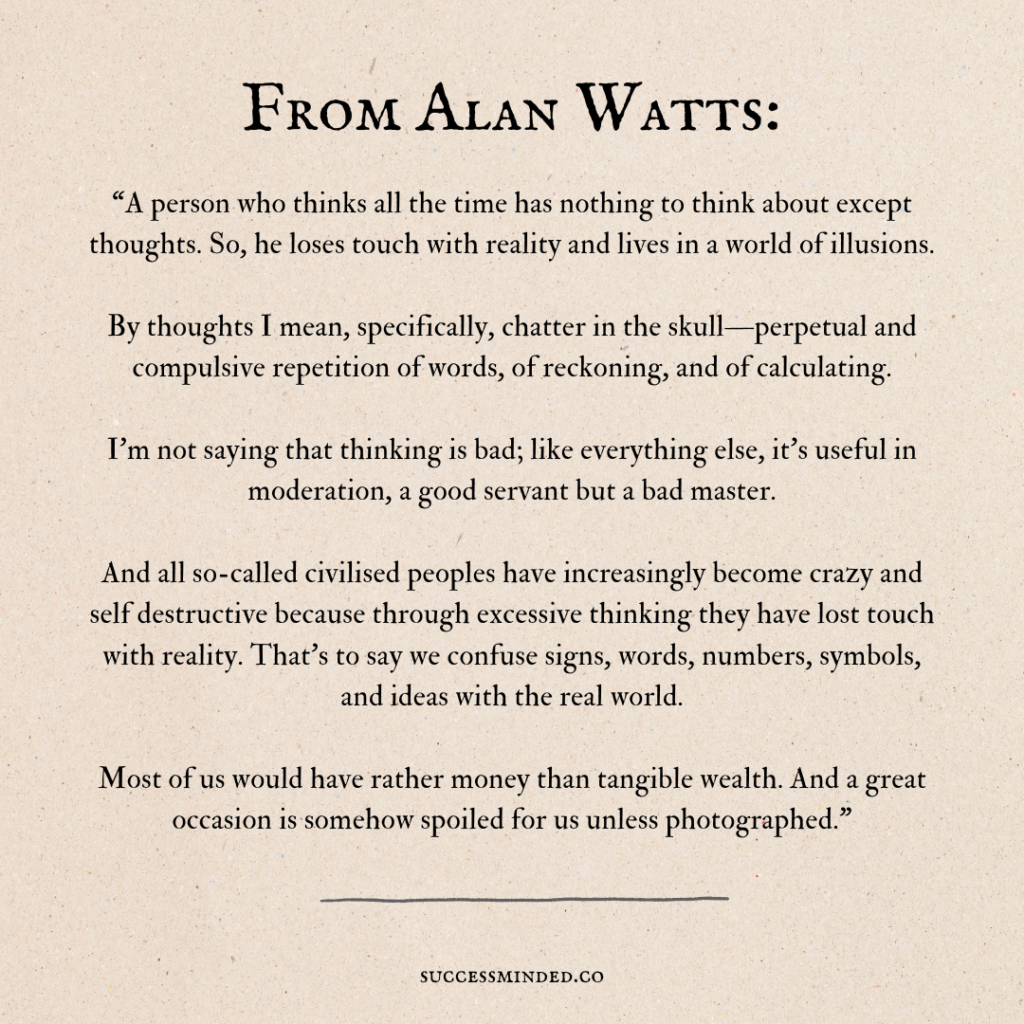Have you ever found yourself lying in bed, staring at the ceiling, your mind racing with a never-ending stream of thoughts? Or maybe sitting at your desk, unable to start a task because you’re too busy overthinking every possible outcome?
You’re not alone.
In our ‘modern’ world, where information is at our fingertips and the pressure to perform is high, it’s easy to get caught in a loop of overthinking. This habit can make us feel like we’re always busy, yet somehow, we end up feeling like we’ve accomplished very little.
Alan Watts, a renowned philosopher known for his efforts to bridge Eastern philosophy with Western culture, once shared a powerful insight on this very issue. He said, “A person who thinks all the time has nothing to think about except thoughts. So, he loses touch with reality and lives in a world of illusions.”
Through this simple yet profound statement, Watts sheds light on the trap of overthinking and the importance of breaking free to truly engage with life. As we dive into his wisdom, let’s explore how we can find a healthier balance between thought and action, ensuring we don’t just exist in our minds but thrive in the real world.
The Full Quote By Alan Watts

“A person who thinks all the time has nothing to think about except thoughts. So, he loses touch with reality and lives in a world of illusions.
By thoughts I mean, specifically, chatter in the skull—perpetual and compulsive repetition of words, of reckoning, and of calculating.
I’m not saying that thinking is bad; like everything else, it’s useful in moderation, a good servant but a bad master.
And all so-called civilised peoples have increasingly become crazy and self destructive because through excessive thinking they have lost touch with reality. That’s to say we confuse signs, words, numbers, symbols, and ideas with the real world.
Most of us would have rather money than tangible wealth. And a great occasion is somehow spoiled for us unless photographed.”
Meaning of the Quote, “A Person Who Thinks All the Time Has Nothing to Think About Except Thoughts.”
Alan Watts, through his insightful observation, warns us of a trap many of us fall into: overthinking.
When he talks about the “chatter in the skull,” he’s referring to the constant, often unnecessary, stream of thoughts that occupy our minds. This isn’t just about planning or reflecting, but a compulsive over-analysis that can lead to paralysis by analysis. Imagine trying to decide on what to eat for breakfast and somehow ending up questioning your entire life’s choices. Sounds familiar, right?
Watts isn’t saying that thinking is inherently bad. After all, it’s our ability to think that allows us to solve problems, make plans, and create beautiful things. However, he emphasizes moderation. Like a good servant, thinking should help us navigate life, not control it.
When we let our thoughts become our master, we risk losing touch with the tangible world around us—the warmth of the sun on our skin, the laughter of a friend, the beauty of a blooming flower. These experiences are what make life real and meaningful.
Moreover, Watts points out a societal issue where we’ve become so absorbed in signs, words, numbers, symbols, and ideas that we confuse them with the real world. This confusion leads us to prioritize abstract concepts like money over tangible wealth, such as health, relationships, and personal growth. We’ve all heard the phrase “money can’t buy happiness,” yet it’s easy to forget when we’re caught up in our thoughts about achieving success and accumulating wealth.
By understanding the essence of Watts’ message, we can begin to see the importance of reconnecting with the reality around us, appreciating life as it is, not just as we think about it.
About Alan Watts

Alan Watts was a British philosopher, writer, and speaker known for his efforts to bring Eastern philosophy to Western audiences. Born in 1915, Watts had a rich life filled with the exploration of religion, philosophy, and the nature of reality. He was particularly fascinated by the ideas found in Buddhism, Hinduism, and Taoism, which influenced much of his work.
Watts was not just a philosopher in the traditional sense; he was a master communicator. His talks and writings were accessible, filled with humor and insight, making complex philosophical ideas understandable to anyone willing to listen. He believed in the interconnectedness of all things and advocated for a life lived in harmony with nature and in the present moment.
One of Watts’ central themes was the distinction between the self and the universe. He argued that this distinction is an illusion, that every individual is an expression of the whole universe. This perspective encourages a sense of unity with the environment and a deep appreciation for the present moment, free from the burdens of past regrets or future anxieties.
Understanding Alan Watts and his philosophy helps us grasp the depth of his thoughts on overthinking and reality. He wasn’t just a critic of modern society’s obsession with thought; he offered a pathway to a more enriching and authentic existence grounded in the present moment and the real world around us.
How to Apply This in Your Life
Incorporating Alan Watts’ wisdom into our lives can transform the way we interact with our thoughts and the world around us. Here are practical steps to reduce excessive thinking and embrace more action and presence in your daily routine:
Practice Mindfulness and Meditation
Mindfulness and meditation are powerful tools for silencing the “chatter in the skull.” By focusing on the present moment—whether it’s your breath, the sensations in your body, or the sounds around you—you can step back from the relentless stream of thoughts. Start with just a few minutes a day, and gradually increase your practice. This habit can help you become more aware of when you’re overthinking and choose to redirect your attention to the present.
Engage in Spontaneous Activities
Break the cycle of overthinking by doing something spontaneous. It could be as simple as taking a different route on your walk, trying a new hobby, or having an impromptu dance party in your living room. These activities don’t require extensive planning or reflection; they just need you to show up and enjoy the moment. This spontaneity can remind you of the joy and freedom found outside of your thoughts.
Connect with Nature
Nature has a way of bringing us back to what’s real and tangible. Spend time outdoors, whether it’s a hike in the mountains, a walk in a local park, or simply sitting under a tree. Observing the simplicity and beauty of nature can help you appreciate the world beyond your internal dialogue, reconnecting you with the reality that Watts emphasizes.
Balance Planning with Doing
While planning is important, it’s equally crucial to follow through with action. If you find yourself stuck in the planning phase, set a small, achievable goal to start with. This could be writing the first sentence of a report, doing ten minutes of exercise, or cleaning a single drawer. Often, taking the first step is all it takes to break out of the paralysis of overthinking and build momentum.
Value Experiences Over Abstract Concepts
Watts encourages us to value tangible wealth and experiences over abstract concepts like money. Reflect on what truly brings you joy and fulfillment. Is it spending time with loved ones, engaging in creative projects, or learning something new? Focus on cultivating these experiences rather than accumulating material wealth or societal status.
Live in the Moment Without Documentation
In an era where capturing every moment on camera has become the norm, Watts’ message reminds us to enjoy experiences without the need for documentation or external validation. Try to experience life’s great occasions fully, with your own senses rather than through a screen. This approach fosters a deeper appreciation for the moment and helps create lasting memories that are felt, not just seen.
By integrating these practices into your life, you can begin to reduce the dominance of overthinking and open yourself up to a more action-oriented, present, and fulfilling existence. Alan Watts’ philosophy not only offers a critique of our modern dilemma but also provides a blueprint for a life filled with real connections, experiences, and joy.
Conclusion
In exploring the wisdom of Alan Watts, we’re reminded of the delicate balance between thought and action, between our inner dialogue and the tangible world. Watts’ insight into the pitfalls of excessive thinking serves as a timely caution for us all, living in an age where our thoughts often drown out the beauty and simplicity of the present moment.
His philosophy encourages us not just to think about life but to truly live it—to embrace the real, the tangible, and the now with open arms and a quiet mind. By practicing mindfulness, engaging in spontaneous activities, connecting with nature, balancing planning with doing, valuing tangible experiences over abstract concepts, and appreciating the unfiltered beauty of life, we can start to loosen the grip that overthinking has on us.
Alan Watts’ teachings go beyond mere advice; they offer a perspective shift that can lead to profound changes in how we perceive ourselves and the world around us. By recognizing that a life well-lived requires a dance between thought and action, we can start to find harmony in our daily lives. It’s not about completely silencing our thoughts but learning to manage them so that they serve us rather than control us.
Let’s take to heart Alan Watts’ message and strive to live more fully in the reality that surrounds us, finding joy in the simple, the natural, and the genuine. By doing so, we not only honor his legacy but also enrich our own lives, making each moment count, free from the shadows of endless thought. This balance is not always easy to achieve, but it is certainly worth striving for as we navigate the complexities of modern life.



